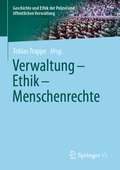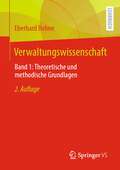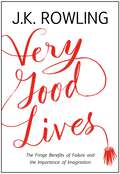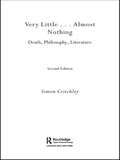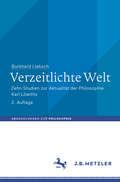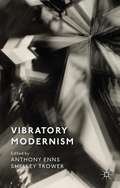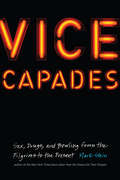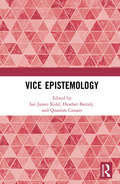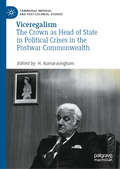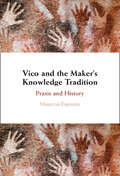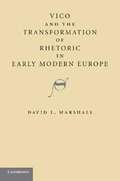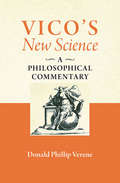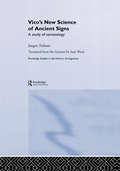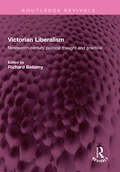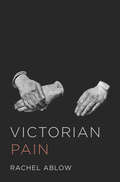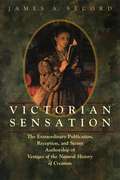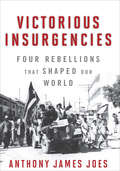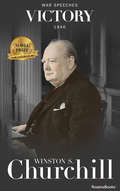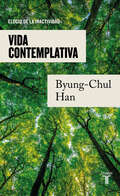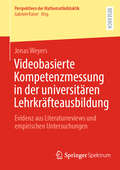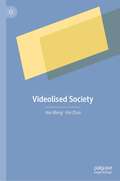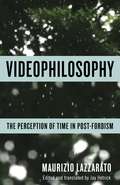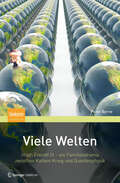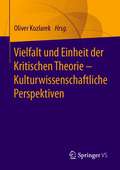- Table View
- List View
Verwaltung - Ethik - Menschenrechte (Geschichte und Ethik der Polizei und öffentlichen Verwaltung)
by Tobias TrappeTrotz der mitunter eingreifenden Gegenwart von Polizei und Verwaltung im Leben und Alltag der Menschen fehlt es in der Bundesrepublik aktuell an einer Ethik der öffentlichen Verwaltung - anders als im europäischen und internationalen Umfeld. Der Band versucht vor diesem Hintergrund einige konzeptionelle Linien auszuziehen, um eine ethisch-normative Reflexion der Verwaltung einschließlich ihrer menschenrechtlichen Verpflichtungen anzuregen.
Verwaltungswissenschaft: Band 1: Theoretische und methodische Grundlagen
by Eberhard BohneDas Buch bietet eine Einführung in die Verwaltungswissenschaft. Das Buch richtet sich an Studierende aller Fachrichtungen, die sich mit Problemen der öffentlichen Verwaltung befassen, sowie an alle Angehörigen von Verwaltungsberufen innerhalb und außerhalb des öffentlichen Dienstes.
Very Good Lives
by J. K. Rowling Joel HollandJ.K. Rowling, one of the world's most inspiring writers, shares her wisdom and advice. In 2008, J.K. Rowling delivered a deeply affecting commencement speech at Harvard University. Now published for the first time in book form, VERY GOOD LIVES presents J.K. Rowling's words of wisdom for anyone at a turning point in life. How can we embrace failure? And how can we use our imagination to better both ourselves and others?Drawing from stories of her own post-graduate years, the world famous author addresses some of life's most important questions with acuity and emotional force. Sales of VERY GOOD LIVES will benefit both Lumos, a non-profit international organization founded by J.K. Rowling, which works to end the institutionalization of children around the world, and university-wide financial aid at Harvard University.
Very Little ... Almost Nothing: Death, Philosophy and Literature (Warwick Studies in European Philosophy)
by Simon CritchleyVery Little ... Almost Nothing puts the question of the meaning of life back at the centre of intellectual debate. Its central concern is how we can find a meaning to human finitude without recourse to anything that transcends that finitude. A profound but secular meditation on the theme of death, Critchley traces the idea of nihilism through Blanchot, Levinas, Jena Romanticism and Cavell, culminating in a reading of Beckett, in many ways the hero of the book. In this second edition, Simon Critchley has added a revealing and extended new preface, and a new chapter on Wallace Stevens which reflects on the idea of poetry as philosophy.
Verzeitlichte Welt: Zehn Studien zur Aktualität der Philosophie Karl Löwiths (Abhandlungen zur Philosophie)
by Burkhard LiebschDas 20. Jahrhundert hat nach der Beobachtung Karl Löwiths eine rückhaltlose Auslieferung der Menschen an Zeit und Geschichte zum Vorschein gebracht. Deren extreme Gewaltsamkeit war für ihn der Anlass, sich auf die ›natürliche‹ Welt zurückzubesinnen, die den Menschen einen verlässlichen Halt bieten sollte. Im Zeichen des oft ausgerufenen Endes der Geschichte, aber auch der Globalisierung mit ihren drängenden ökologischen Fragen ist Löwiths Beitrag zu der Frage, was die Welt der Menschen als solche ausmacht, von höchster Aktualität.Die bereits vorliegenden neun Studien zur Philosophie Löwiths werden durch eine abschließende zehnte ergänzt, die ganz dieser nach wie vor virulenten Aktualität gewidmet ist.
Vibratory Modernism
by Shelley Trower Anthony EnnsVibratory Modernism is a collection of original essays that show how vibrations provide a means of bridging science and art two fields that became increasingly separate in the nineteenth and early twentieth centuries. "
Vice & Virtue in Everyday Life: Introductory Readings in Ethics
by Christina Hoff Sommers Fred SommersA comprehensive and provocative collection of both classical and contemporary voices in perennial ethical debates, Vice and Virtue has established itself as one of the truly outstanding anthologies for Introduction to Ethics Courses.
Vice Capades: Sex, Drugs, and Bowling from the Pilgrims to the Present
by Mark SteinFrom outlawing bowling in colonial America to regulating violent video games and synthetic drugs today, Mark Stein’s Vice Capades examines the nation’s relationship with the actions, attitudes, and antics that have defined morality. This humorous and quirky history reveals that our views of vice are formed not merely by morals but by power. While laws against nude dancing have become less restrictive, laws restricting sexual harassment have been enacted. While marijuana is no longer illegal everywhere, restrictive laws have been enacted against cigarettes. Stein examines this nation’s inconsistent moral compass and how the powers-that-be in each era determine what is or is not deemed a vice. From the Puritans who founded Massachusetts with unyielding, biblically based laws to those modern purveyors of morality who currently campaign against video game violence, Vice Capades looks at the American history we all know from a fresh and exciting perspective and shows how vice has shaped our nation, sometimes without us even knowing it.
Vice Epistemology
by Ian James Kidd, Heather Battaly, and Quassim CassamSome of the most problematic human behaviors involve vices of the mind such as arrogance, closed-mindedness, dogmatism, gullibility, and intellectual cowardice, as well as wishful or conspiratorial thinking. What sorts of things are epistemic vices? How do we detect and mitigate them? How and why do these vices prevent us from acquiring knowledge, and what is their role in sustaining patterns of ignorance? What is their relation to implicit or unconscious bias? How do epistemic vices and systems of social oppression relate to one another? Do we unwittingly absorb such traits from the process of socialization and communities around us? Are epistemic vices traits for which we can blamed? Can there be institutional and collective epistemic vices? This book seeks to answer these important questions about the vices of the mind and their roles in our social and epistemic lives, and is the first collection of its kind. Organized into three parts, chapters by outstanding scholars explore the nature of epistemic vices, specific examples of these vices, and case studies in applied vice epistemology, including education and politics. Alongside these foundational questions, the volume offers sophisticated accounts of vices both new and familiar. These include epistemic arrogance and servility, epistemic injustice, epistemic snobbishness, conspiratorial thinking, procrastination, and forms of closed-mindedness. Vice Epistemology is essential reading for students of ethics, epistemology, and virtue theory, and various areas of applied, feminist, and social philosophy. It will also be of interest to practitioners, scholars, and activists in politics, law, and education.
Viceregalism: The Crown as Head of State in Political Crises in the Postwar Commonwealth (Cambridge Imperial and Post-Colonial Studies Series)
by H. KumarasinghamThis book examines how the Crown has performed as Head of State across the UK and post war Commonwealth during times of political crisis. It explores the little-known relationships, powers and imperial legacies regarding modern heads of state in parliamentary regimes where so many decisions occur without parliamentary or public scrutiny. This original study highlights how the Queen’s position has been replicated across continents with surprising results. It also shows the topicality and contemporary relevance of this historical research to interpret and understand crises of governance and the enduring legacy of monarchy and colonialism to modern politics. This collection uniquely brings together a diverse set of states including specific chapters on England, Scotland, Northern Ireland, Sri Lanka, Malaysia, Brunei, Ghana, Nigeria, Zimbabwe/Rhodesia, Australia, Tuvalu, and the Commonwealth Caribbean. Viceregalism is written and conceptualised to remind that the Crown is not just a ceremonial part of the constitution, but a crucial political and international actor of real importance.
Vico and the Maker's Knowledge Tradition: Praxis and History
by Maurizio EspositoPublished in 1710, Giambattista Vico's groundbreaking On the Most Ancient Wisdom of the Italians argued, against Descartes, that knowledge is more about making and producing than speculating and theorising. Historicised activities precede any kind of ethereal abstraction. Maurizio Esposito situates Vico's epistemology of praxis within the longstanding tradition of the maker's knowledge perspective and shows how Vico transformed the ancient idea that knowledge is a form of making into a humanist and existential principle. Humans do not merely fabricate tools and transform nature; they also create symbolic spaces in which different forms of thinking and understanding evolve. Esposito explores the possibility that Vico envisioned a non-Cartesian version of modernity, where praxis, rather than reason, drives human history. This alternative modernity has directly or indirectly influenced some of the most significant philosophical traditions of the past two centuries and is more relevant today than ever.
Vico and the Transformation of Rhetoric in Early Modern Europe
by David L. MarshallConsidered the most original thinker in the Italian philosophical tradition, Giambattista Vico has been the object of much scholarly attention but little consensus. In this new interpretation, David L. Marshall examines the entirety of Vico's oeuvre and situates him in the political context of early modern Naples. He demonstrates Vico's significance as a theorist who adapted the discipline of rhetoric to modern conditions. Marshall presents Vico's work as an effort to resolve a contradiction. As a professor of rhetoric at the University of Naples, Vico had a deep investment in the explanatory power of classical rhetorical thought, especially that of Aristotle, Cicero, and Quintilian. Yet as a historian of the failure of Naples as a self-determining political community, he had no illusions about the possibility or worth of democratic and republican systems of government in the post-classical world. As Marshall demonstrates, by jettisoning the assumption that rhetoric only illuminates direct, face-to-face interactions between orator and auditor, Vico reinvented rhetoric for a modern world in which the Greek polis and the Roman res publica are no longer paradigmatic for political thought.
Vico's "New Science": A Philosophical Commentary
by Donald Phillip VereneGiambattista Vico (1668–1744) is best remembered for his major work, the New Science (Scienza nuova), in which he sets forth the principles of humanity and gives an account of the stages common to the development of all societies in their historical life. Controversial at the time of its publication in 1725, the New Science has come to be seen as the most ambitious attempt before Comte at a comprehensive science of human society and the most profound analysis of the philosophy of history prior to Hegel. Despite the fundamental importance of the New Science, there has been no philosophical commentary of the text in any language, until now. Written by the noted Vico scholar Donald Phillip Verene, this commentary can be read as an introduction to Vico's thought or it can be employed as a guide to the comprehension of specific sections of the New Science. Following the structure of the text scrupulously, Verene offers a clear and direct discussion of the contents of each division of the New Science with close attention to the sources of Vico's thought in Greek philosophy and in Roman jurisprudence. He also highlights the grounding of the New Science in Vico's other works and the opposition of Vico’s views to those of the seventeenth-century natural-law theorists. The addition of an extensive glossary of Vico’s Italian terminology makes this an ideal companion to Vico’s masterpiece, ideal for both beginners and specialists.
Vico's New Science of Ancient Signs: A Study of Sematology
by Jürgen TrabantJürgen Trabant reads the profound insights into human semiosis contained in Vico's 'sematology' as both a spirited rejection of Cartesian philosophy and an early critique of enlightened logocentricism. Sean Ward's translation makes this work available to an English-reading audience for the first time.
Victorian Liberalism: Nineteenth-century political thought and practice (Routledge Revivals)
by Richard BellamyFirst published in 1990, Victorian Liberalism brings together leading political theorists and historians in order to examine the interplay of theory and ideology in nineteenth-century liberal thought and practice. Drawing on a wide range of source material, the authors examine liberal thinkers and politicians from Adam Smith, Jeremy Bentham, and John Stuart Mill to William Gladstone and Joseph Chamberlain. Connections are drawn throughout between the different languages which made-up liberal discourse and the relations between these vocabularies and the political movements and changing social reality they sought to explain. The result is a stimulating volume that breaks new ground in the study of political history and the history of political thought.
Victorian Pain
by Rachel AblowThe nineteenth century introduced developments in science and medicine that made the eradication of pain conceivable for the first time. This new understanding of pain brought with it a complex set of moral and philosophical dilemmas. If pain serves no obvious purpose, how do we reconcile its existence with a well-ordered universe? Examining how writers of the day engaged with such questions, Victorian Pain offers a compelling new literary and philosophical history of modern pain.Rachel Ablow provides close readings of novelists Charlotte Brontë and Thomas Hardy and political and natural philosophers John Stuart Mill, Harriet Martineau, and Charles Darwin, as well as a variety of medical, scientific, and popular writers of the Victorian age. She explores how discussions of pain served as investigations into the status of persons and the nature and parameters of social life. No longer conceivable as divine trial or punishment, pain in the nineteenth century came to seem instead like a historical accident suggesting little or nothing about the individual who suffers.A landmark study of Victorian literature and the history of pain, Victorian Pain shows how these writers came to see pain as a social as well as a personal problem. Rather than simply self-evident to the sufferer and unknowable to anyone else, pain was also understood to be produced between persons—and even, perhaps, by the fictions they read.
Victorian Sensation: The Extraordinary Publication, Reception, and Secret Authorship of Vestiges of the Natural History of Creation
by James A. SecordFiction or philosophy, profound knowledge or shocking heresy? When Vestiges of the Natural History of Creation was published anonymously in 1844, it sparked one of the greatest sensations of the Victorian era. More than a hundred thousand readers were spellbound by its startling vision--an account of the world that extended from the formation of the solar system to the spiritual destiny of humanity. As gripping as a popular novel, Vestiges combined all the current scientific theories in fields ranging from astronomy and geology to psychology and economics. The book was banned, it was damned, it was hailed as the gospel for a new age. This is where our own public controversies about evolution began. In a pioneering cultural history, James A. Secord uses the story of Vestiges to create a panoramic portrait of life in the early industrial era from the perspective of its readers. We join apprentices in a factory town as they debate the consequences of an evolutionary ancestry. We listen as Prince Albert reads aloud to Queen Victoria from a book that preachers denounced as blasphemy vomited from the mouth of Satan. And we watch as Charles Darwin turns its pages in the flea-ridden British Museum library, fearful for the fate of his own unpublished theory of evolution. Using secret letters, Secord reveals how Vestiges was written and how the anonymity of its author was maintained for forty years. He also takes us behind the scenes to a bustling world of publishers, printers, and booksellers to show how the furor over the book reflected the emerging industrial economy of print. Beautifully written and based on painstaking research, Victorian Sensation offers a new approach to literary history, the history of reading, and the history of science. Profusely illustrated and full of fascinating stories, it is the most comprehensive account of the making and reception of a book (other than the Bible) ever attempted. Winner of the 2002 Pfizer Award from the History of Science Society
Victorious Insurgencies: Four Rebellions that Shaped our World
by Anthony James JoesThe author of Resisting Rebellion examines four of the twentieth century&’s most consequential rebellions—in China, Cuba, Afghanistan, and French Indochina. While insurgencies continue to erupt across the globe, most of them fail to meet their intended aims. But in Four Rebellions that Shaped Our World, Anthony James Joes analyzes four successful rebellions which permanently altered the global political arena: the Maoists in China against Chiang Kai-shek and the Japanese in the 1930s and 1940s; the Viet Minh in French Indochina from 1945 to 1954; Castro's followers against Batista in Cuba from 1956 to 1959; and the mujahideen in Soviet Afghanistan from 1980 to 1989. Joes illuminates patterns of failed counterinsurgencies, highlighting their avoidable political and military blunders as well as the critical influence of the international setting. Offering provocative insights that are applicable to twenty-first century geopolitics, this comprehensive study will be of great interest to policy-makers and concerned citizens alike.
Victory: 1946 (Winston S. Churchill War Speeches #4)
by Winston S. ChurchillThe Nobel Prize-winning Prime Minister&’s historic speeches from the final year of WWII are collected in this essential volume. During the final eight months of World War II, Prime Minister Winston Churchill gave some of the most brilliant and consequential speeches of his career. Here are Churchill&’s war status reports delivered to the House of Commons, his rousing statements to the British people, and his global broadcasts, including his announcement of Germany&’s unconditional surrender on May 8th, 1945. These speeches detail Churchill's public reactions to the forming of the United Nations, the death of Roosevelt, the dropping of the Atomic Bomb, and, lastly, the election that defeats him. Perhaps most notable is the "Gestapo" speech of 1945, in which Churchill made a controversial comparison between a Socialist government and the Gestapo—an extremely charged word at that time—that many believe cost him his job as Prime Minister.
Vida contemplativa: Elogio de la inactividad
by Byung-Chul HanUn poderoso llamamiento a abandonar la vida hiperactiva para recuperar el sentido de nuestras vidas, el equilibrio y la riqueza interior. Estamos perdiendo nuestra capacidad de no hacer nada. Nuestra existencia está completamente absorbida por la actividad y, por lo tanto, completamente explotada. Dado que solo percibimos la vida en términos de rendimiento, tendemos a entender la inactividad como un déficit, una negación o una mera ausencia de actividad cuando se trata, muy al contrario, de una interesante capacidad independiente. Byung-Chul Han indaga en los beneficios, el esplendor y la magia de la ociosidad y diseña una nueva forma de vida, que incluya momentos contemplativos, con la que afrontar la crisis actual de nuestra sociedad y frenar nuestra propia explotación y la destrucción de la naturaleza.
Videobasierte Kompetenzmessung in der universitären Lehrkräfteausbildung: Evidenz aus Literaturreviews und empirischen Untersuchungen (Perspektiven der Mathematikdidaktik)
by Jonas WeyersInnerhalb der Forschung zur professionellen Kompetenz von Lehrkräften kommen vermehrt videobasierte Kompetenzmessungen zum Einsatz. Durch die Kombination von Videomaterial unterrichtlicher Praxis mit spezifischen Testfragen sollen Rückschlüsse auf handlungsnahe Kompetenzen bzw. sogenannte situationsspezifische Fähigkeiten von Lehrkräften ermöglicht werden. Auf Basis von zwei Literaturreviews untersucht die vorliegende Arbeit die Konzeption und Erfassung situationsspezifischer Fähigkeiten am Beispiel des Konstrukts "Teacher Noticing", welches in der mathematikdidaktischen Forschung besonders verbreitet ist, und gibt einen umfassenden Überblick zu vorliegenden Testinstrumenten, die auf dieses Konstrukt abzielen. Insbesondere wird diskutiert, inwieweit unterschiedliche Messansätze zu vergleichbaren Ergebnissen führen und welche Konsequenzen sich aus der Heterogenität der Messansätze für den wissenschaftlichen Diskurs ergeben. Anhand zweier empirischer Arbeiten wird weiterführend geprüft, inwieweit anspruchsvolle videobasierte Kompetenzmessungen bereits mit Lehramtsstudierenden einsetzbar sind und Rückschlüsse auf deren Kompetenzentwicklung zulassen. Die Ergebnisse stützen dabei grundsätzlich die Einsetzbarkeit in der universitären Phase der Lehrkräfteausbildung, wobei sich nur geringe Zusammenhänge zu den Lerngelegenheiten innerhalb dieses Ausbildungsabschnitts zeigen.
Videolised Society
by Hui Zhao Jian MengThis book traces the development of video (especially short video, duan shipin) in China over the past few years, exploring how these videos engaged with China’s rapidly changing society, how they enriched existed theories of society, media and communication, and new theories to be extracted. The book offers a new, critical model for understanding the relationship between video, video theory, video industry and the State. This book sheds light on the overall description and explanation of the current socio-political, economic and cultural environment concerning the development of video (especially short video). It interprets the emergence of the “Social Videolization” through the subjects of media psychology, communication studies and cultural criticism, media industrial studies, sociology and anthropology.
Videophilosophy: The Perception of Time in Post-Fordism (Columbia Themes in Philosophy, Social Criticism, and the Arts)
by Maurizio LazzaratoThe Italian philosopher Maurizio Lazzarato has earned international acclaim for his analysis of contemporary capitalism, in particular his influential concept of immaterial labor and his perceptive writings on debt. In Videophilosophy, he reveals the underpinnings of contemporary subjectivity in the aesthetics and politics of mass media. First written in French and published in Italian and later revised but never published in full, this book discloses the conceptual groundwork of Lazzarato’s thought as a whole for a time when his writings have become increasingly influential.Drawing on Bergson, Nietzsche, Benjamin, Deleuze and Guattari, and the film theory and practice of Dziga Vertov, Lazzarato constructs a new philosophy of media that ties political economy to the politics of aesthetics. Through his concept of “machines that crystallize time,” he argues that the proliferation of digital technologies over the past half-century marks the transition to a new mode of capitalist production characterized by unprecedented forms of subjection. This new era of the commodification of the self, Lazzarato declares, demands novel types of political action that challenge the commercialization and exploitation of time. This crucial text by an essential contemporary thinker offers vital new perspectives on aesthetics, politics, and media and critical theory.
Viele Welten
by Peter ByrnePeter Byrne erzählt die Lebensgeschichte von Hugh Everett III (1930-1982), dessen Theorie der multiplen Universen die Physik und Philosophie entscheidend beeinflusst hat. Neben seiner berühmten Interpretation der Quantenmechanik verfasste Everett eine klassische Arbeit zur Spieltheorie, entwickelte wegweisende Computeralgorithmen und leistete Pionierarbeit auf dem Gebiet der Künstlichen Intelligenz. Diesem anschaulichen Porträt liegen bisher unveröffentlichte Schriften Everetts zugrunde sowie Interviews mit Freunden, Kollegen und Verwandten.
Vielfalt und Einheit der Kritischen Theorie – Kulturwissenschaftliche Perspektiven
by Oliver KozlarekDie in diesem Buch versammelten Arbeiten gehen der Frage nach, ob die Tradition der Kritischen Theorie mit ihrer multifokalen und vor allem interdisziplinären kritischen Sozialforschung dem Anspruch einer übergreifenden politischen wie wissenschaftlichen Praxis der Kritik für unsere aktuellen Gesellschaften gerecht wird. Es geht somit auch um eine „Aktualisierung“ der Kritischen Theorie. Diese soll aber gerade nicht durch das Herausarbeiten eines neuen Begriffsinstrumentariums diagnostischer und/oder normativer Art geschehen, sondern dadurch, dass ganz im Sinne des interdisziplinären Forschungsansatzes der Kritischen Theorie unsere hochkomplexen spätmodernen Gesellschaften als Räume transparent werden, in denen sich unterschiedliche Erfahrungslinien kreuzen.
